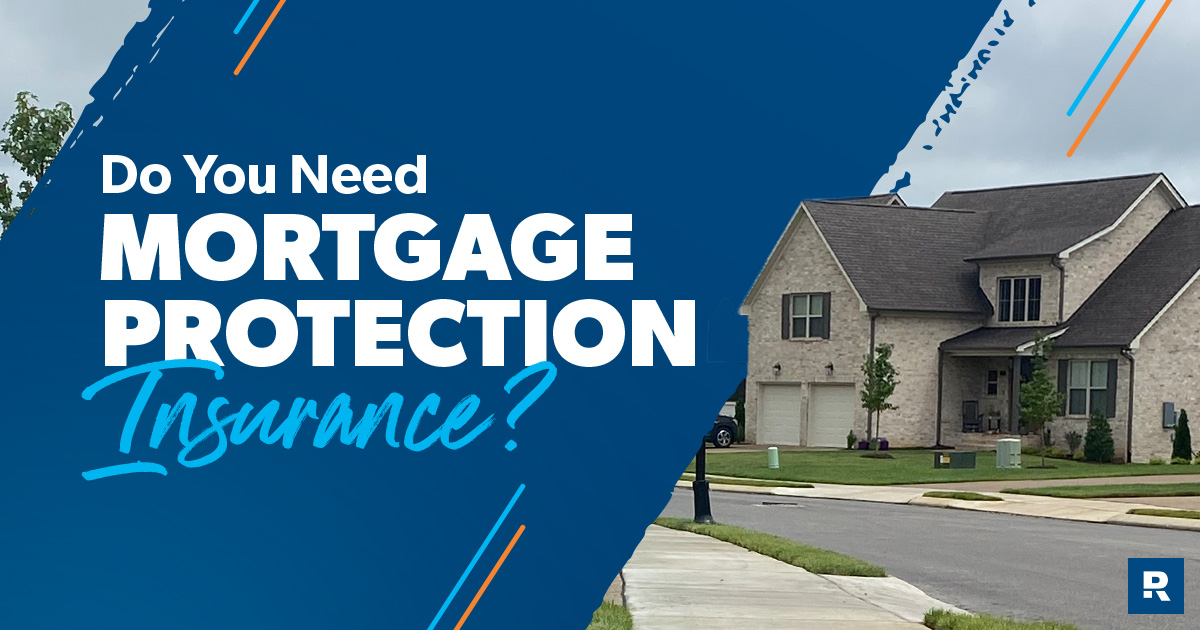
Have you ever woken up in a cold sweat under the roof of your partially paid-off house thinking, What if I die and my family can’t afford the mortgage? It’s a legit concern.
That kind of heart-pounding anxiety may make you consider mortgage protection insurance. But what is mortgage protection insurance exactly, and is it a good idea? Let’s find out.
What Is Mortgage Protection Insurance?
If you die owing money on your house, mortgage protection insurance (MPI) will pay it off. Some policies let you add riders (extra coverage at an extra cost) to cover your payments for a time if you become disabled or lose your job.
Sounds good, right? Well, maybe not. Let’s break it down.
Mortgage protection insurance is a kind of life insurance—in fact, it’s sometimes called mortgage life insurance or mortgage protection life insurance—but it’s generally sold by banks and lenders rather than life insurance companies.
You don’t need to pass a medical exam to qualify for MPI. But you can be excluded from getting it if you are a senior citizen (sorry, grampa), permanently disabled or not a U.S. citizen.
How does mortgage protection insurance work?
If you have an MPI policy when you die, your insurance benefit will go directly to the mortgage lender or bank rather than your family. The benefit pays off whatever remains of your mortgage balance. Different policies pay out different ways. Some pay off the mortgage with payments over a period like five years, while others pay it off in one lump sum.
So your heir will receive a fully paid-off house, but they’ll never see any money from the insurance benefit.
Need Help? Download Our Term Life Cheat Sheet.
Learn our go-to advice about life insurance and when you may need to adjust how much coverage you get.
MPI vs. PMI
People often get MPI and PMI confused, and it’s understandable. After all, they’re both mortgage acronyms. (We’ll get to what PMI stands for in a minute.) But just like wearing a PDF won’t save your life in a shipwreck (you’re going to want a PFD—personal flotation device—for that), PMI is not the same thing as MPI. And PMI won’t help your family if you die. (Can you ever have TMI about PMI? We don’t think so.)
Private mortgage insurance (PMI) is a type of insurance for your lender. You’re still paying the premiums, but it’s for insurance to protect your lender’s money (you know, the money you borrowed to buy your house) in case you’re foreclosed on because you can’t make the payments anymore (or you die). Yikes!
This kind of insurance is usually mandatory if you put less than 20% down. If that’s you, PMI will be included in your monthly mortgage payment. That’s because anyone who can’t scrape together a 20% down payment is a riskier person to loan money to.
MPI vs. MIP
Now for the third acronym using the same letters (are we playing Scrabble?): Mortgage insurance premium (MIP). MIP refers to the payments made by people who take out loans backed by the Federal Housing Administration (FHA). FHA loans (which we never recommend, by the way) don’t require as high of a down payment or credit score to qualify. So to help hedge their bets in case you default, the FHA also requires borrowers to pay an MIP.
Compare Term Life Insurance Quotes
These payments are calculated as a percentage of your loan value and divided into two kinds of payments: an up-front MIP and an annual MIP—kind of like a double dip on the MIP. The up-front MIP is paid once at closing (thank God) while the annual MIP is usually divided into 12 monthly payments.
MIPs do not offer any protection to the homeowner or their family in case they die.
How Much Does Mortgage Protection Insurance Cost?
Now that we’ve sorted out the acronym insanity, let’s go back to MPI. One of the big strikes against mortgage protection insurance is cost: It can be quite expensive. Remember how we mentioned there’s no medical exam associated with MPI? Except for the exclusions we listed earlier, MPI policies have guaranteed acceptance, and that jacks the price way up.
Your MPI premiums will depend big time on the size of your mortgage at the time you purchase MPI.
Here are some other factors that go into the cost of MPI:
- How old you are
- Whether you smoke
- Whether the policy covers one or both spouses
- Any riders you add (like a long-term disability rider that covers mortgage payments if you’re disabled)
Got Kids? Use These 5 Tips to Get the Right Length of Life Insurance.
If you have kids depending on your income, you might be wondering, How long should my life insurance policy last? Great question!
Mortgage Protection Insurance Compared to Level Term Life Insurance
Like we mentioned earlier, mortgage protection insurance is a type of life insurance. But is it a good type? How does it compare to the best life insurance buy out there, level term life insurance?
It turns out, not very well. Mortgage protection insurance is much pricier than term life because it has no medical exam. Just how much is mortgage protection insurance? Well, it really depends on the size of your mortgage—because your premium is based on a percentage of that.
MPI also forces your beneficiaries to use the payout for the house and doesn’t provide money for anything else. Not the most flexible way to protect them, is it?
But with term life, you can buy a level term policy (that just means the premiums stay the same for the life of the policy) worth $1 million for much cheaper, pay the house off with that—and have money left over! Hell yes!
Sound too good to be true? Below we’ve laid out the good and the bad of MPI and level term life insurance so you can compare for yourself.
Pros and Cons of Mortgage Protection Insurance
Pros:
- If you die, your family won’t have to worry about making the mortgage payments and getting kicked out of their home.
- There’s no medical exam. You can be a chain-smoking, TB-riddled, Little Debbie addict and you’ll qualify.
Cons:
- The value of your MPI policy decreases the longer you live while paying off your mortgage. As you pay down the balance on your house, you owe less (duh), which means you don’t need as much insurance. But your premiums don’t decrease! So basically, you’re just losing money. This is idiotic.
- Premiums are very high because there’s no medical exam.
- Your family gets no payout from this type of life insurance. The benefit goes straight to the lender or bank. It can’t be used to pay for the funeral or other bills.
Here's A Tip
Tip: The value of your MPI policy decreases as you pay down your mortgage, but your premiums stay the same.
Pros and Cons of Level Term Life Insurance
Pros:
- Term life pays out a set benefit that goes to your family or whoever you named as your beneficiary. They can use the money to do whatever they want with it—including pay off the house! And they’ll likely have money left over.
- You pay low monthly premiums.
- You get a higher benefit. (You can get $1 million in term life coverage for as little as 30 bucks a month. Check out our estimator at the end of this article.)
Cons:
- You might need a medical exam. (But it’s not that bad, and it isn’t necessarily required.)
Learn the Smarter Way to Do Life Insurance
Life insurance can feel freakin’ confusing. Sign up to get Ramsey’s no-nonsense advice, including free access to Dave’s video from Financial Peace University (normally $80), plus guides and resources sent right to your inbox.
Is Mortgage Protection Insurance Worth It?
It’s a really good idea to protect your family against the life-wrecking possibility that you could die unexpectedly—you never want them in a position where they’re forced to leave their home. But you have to be smart about it. So, is mortgage protection insurance worth it? Comparing the pros and cons above, that has to be a no.
That said, if you’ve got some serious health issues that make you uninsurable, MPI is the next best option to help your family pay off the house if you die. Since it’s a guaranteed issue policy (aka no medical exam) you’ll have a better chance of qualifying. Just remember, the only time MPI makes sense is if you're uninsurable. Otherwise, it's a rip-off compared to term life.
A Better Way
There is a smart way to make sure your family will be taken care of financially if the worst should happen. Life insurance should do one thing: Replace your income if you die—and that’s exactly what term life does. A level term life policy offers so much more coverage than an MPI policy can offer, and at a fraction of the cost.
If you’ve decided term life is the right fit for you (trust us, it is), talk to our friends at Zander Insurance. They’re experts and won’t try to sell you on any life insurance schemes that make money for others instead of protecting you.



